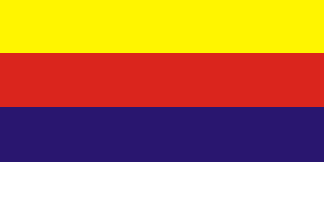![[Provincial flag of Zeeland]](../images/n/nl-ze.gif) image by Mark Sensen, 4 May 1999
image by Mark Sensen, 4 May 1999

Last modified: 2009-03-28 by jarig bakker
Keywords: zeeland |
Links: FOTW homepage |
search |
disclaimer and copyright |
write us |
mirrors
![[Provincial flag of Zeeland]](../images/n/nl-ze.gif) image by Mark Sensen, 4 May 1999
image by Mark Sensen, 4 May 1999
Sierksma's 'Nederlands vlaggenboek', 1962, has this: 'Zeeland's flag
was adopted 14 January 1949. It deviates from the Dutch vexillological
practice of not placing coats of arms on flags, but even historically this
is justified. Old flagbooks and -charts show very often a red-white-blue
Zeeland flag (with equally wide stripes, or with a wider white stripe,
f.i. zna99, p. 19 and <nl-ze17x.gif>) within the white stripe the complete
coat of arms of Zeeland, often with below it two crossed laurel branches.
Quite often the shield without crown and laurel branches can be found.
Only two flag-sources, from 1667 (the Neapolitan manuscript) and a manuscript
originating from Zeeland in the second half of the 18th century, deleted
the coat of arms. In those days Zeeland used the RWB flag; only in one
case orange - white - blue. In the designing of the new flag it was considered
that red-white-blue was not very specific for Zeeland, so one looked into
a different direction. A design of a member of the Zeeland 'Gedeputeerde
Staten', jhr. mr. T. A. J. W. Schorer was finally chosen. Note that the
motto on the coat of arms ('luctor et emergo' - I wrestle and emerge
- a motto, which was adopted after Zeeland fought itself free from Spain
with the help of the English, 1585), while the number of stripes is one
more than on the coat of arms. This was done at the insistence of mr. Schorer
on esthetical grounds: it is better visible with a dark stripe on top and
at the bottom! The flag gained immediate popularity in Zeeland and became
nationally known after the flood-catastrophe of February 1951.
Jarig Bakker 13 Mar 2000
.gif) International
Civic Arms : http://www.ngw.nl/
International
Civic Arms : http://www.ngw.nl/
"Per fess wavy; I or, a demi lion, issuing from the dividing line gules, armed and langued azure; II barry wavy of six azure ans argent. The shield is crested by a coronet of four pearls between five leaves or. Supporters: two lions rampant gules, armed and langued azure. On a white ribbon the motto LUCTOR ET EMERGO in black lettering."
The arms of the province of Zeeland (or (Old) Zealand) are the lion
of Holland struggling on a sea. The counts of Holland and the Vlaanderen
(Flanders) jointly governed the group of islands between their homelands.
The counts of Holland tried in the 12-13th century to get their stronghold
in the area. They finally succeeded in 1299. They, however, did not adapt
arms as Counts of Zeeland. The arms were developed in the 15-16th centuries.
 image by Jarig Bakker, 26 Jan 2001
image by Jarig Bakker, 26 Jan 2001
In 1938 Queen Wilhelmina had reigned the Netherlands for 40 years. On
that occasion a lot of municipalities paraded in front of HM with their
flags, which consisted of the provincial flag with the municipal CoA in
the canton (or something...). Those municipal flags can only be considered
as 'curiosities', while the status of the provincial flags is not quite
clear.
Jarig Bakker, 26 Jan 2001
![[Historical flag of Zeeland]](../images/n/nl-ze17x.gif) image by Mark Sensen, 30 Mar 1998
image by Mark Sensen, 30 Mar 1998
Red over white over blue. On the white stripe, a shield surmounted by
a crown and encircled by a garland of leaves - the shield extends into
the other stripes slightly. On the shield, a red demi-lion on a yellow
background, rising out of a blue base.
(Source: Dutch atlas made by Delisle in 1739)
James Dignan, 14 Nov 1996
![[Zeeland admiralty flag]](../images/n/nl-ze~ad.gif) image by Klaus-Michael Schneider, 23 Mar 2009
image by Klaus-Michael Schneider, 23 Mar 2009
Admiralty of Zeeland
It is a green flag with the coat of arms of Zeeland in the centre,
topped by a coronet. The coat of arms is superimposing two golden anchors
crossed by saltire.
According to source the flag was used during the years of insurrection
against the Spanish rule.
Furthermore according to source all the five coastal provinces had
their own admiralty flags with a coat of arms upon crossed anchors.
Source: Cigarette album: “Die Welt in Bildern, Bd.8; Historische
Fahnen”; p.32; image no.112
Klaus-Michael Schneider, 23 Mar 2009